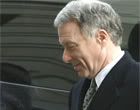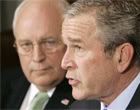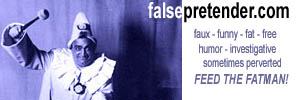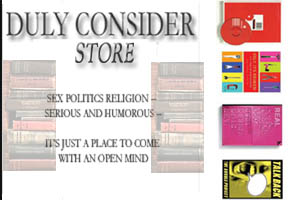Recently quoted by Venezuelan President Hugo Chavez in his now infamous speech at the UN, September 21, 2006 (the one where Chavez calls young George W. Bush the devil eight times), Chomsky is once again recognized as one of the most influential thinkers of all time, although, ironically by one of the least influential thinkers of all time (Chavez).
Clearly, the book is a long and dense read, but if you find the excerpt below interesting, you might find it worthwhile to read the whole text thus enriching yourself with an eye-opening analysis of the world today as it is more and more dominated by the US.
Following the excerpt is a television interview with Charlie Rose.
From Hegemony or Survival, Metropolitan Books, 2003
photo by John Soares

Noam Chomsky, Professor, Linguistics and Philosophy, MIT / Author, Hegemony or Survival.
A few years ago, one of the great figures of contemporary biology, Ernst Mayr, published some reflections on the likelihood for success in the search for extraterrestrial intelligence (SETI). Mayr took exception to the conclusions of astrophysicists who confidently expected to find higher intelligence throughout the universe. He considered the prospects of success very low. His reasoning had to do with the adaptive value of what we call "higher intelligence," meaning the particular human form of intellectual organization. Mayr estimated the number of species since the origin of life at about 50 billion, only one of which "achieved the kind of intelligence needed to establish a civilization." It did so very recently, perhaps a hundred thousand years ago. It is generally assumed that only one small breeding group survived, of which we are all descendants, apparently with very little genetic variation. What we call "civilizations" developed near the end of this brief moment of evolutionary time, and are "inevitably are short-lived."
Mayr speculates that higher intelligence may not be favored by selection. The history of life on Earth, he concluded, refutes the claim that "it is better to be smart than to be stupid," at least judging by biological success: beetles and bacteria, for example, are far more successful than primates in these terms, and that is generally true of creatures that fill a specific niche or can undergo rapid genetic change. He also made the rather somber observation that "the average life expectancy of a species is about 100,000 years."
We are entering a period of human life that may provide an answer to the question of whether it is better to be smart than stupid -- whether there is intelligent life on earth, in some sense of "intelligence" that might be admired by a sensible extraterrestrial observer, could one exist. The most hopeful prospect is that the question will not be answered: if it receives a definite answer, that answer can only be that humans were a kind of "biological error," using their allotted 100,000 years to destroy themselves and, in the process, much else. The species has surely developed the capacity to do just that, and our hypothetical extraterrestrial observer might conclude that they have demonstrated that capacity throughout their history, dramatically in the past few hundred years, with an assault on the environment that sustains life, on the diversity of more complex organisms, and with cold and calculated savagery, on each other as well.
1.1. "Two Superpowers"
The year 2003 opened with many indications that concerns about human survival are all too realistic. To mention just a few examples, in October 2002 it was learned that a possibly terminal nuclear war was barely avoided, by a near miracle, 40 years earlier. Immediately after this startling discovery, the Bush administration unilaterally blocked UN efforts to ban the militarization of space, a serious threat to survival. It also terminated international negotiations to prevent biological warfare, and moved to ensure that it would have no choice but to attack Iraq despite popular opposition at home and abroad that was entirely without historical precedent.
Aid organizations with extensive experience in Iraq, and studies by respected medical organizations, warned that the planned invasion might precipitate a humanitarian catastrophe. The warnings were ignored by Washington and evoked little media interest. A high-level US task force concluded that attacks with weapons of mass destruction (WMD) within the United States are "likely," and would become more so in the event of war with Iraq. Many specialists and intelligence and security agencies, in the US and elsewhere, agreed. Such concerns were heightened by the release in September 2002 of the Bush administration's National Security Strategy, which declared the right to resort to force to eliminate any perceived challenge to US global hegemony, now or ever. Specialists and intelligence agencies warned again that Washington 's belligerence was increasing the long-term threat of international terrorism and proliferation of WMD. These warnings too were dismissed, indicating how human lives, including American lives, rank in the scale of priorities.
In the same month, September 2002, a propaganda campaign was launched to depict Saddam Hussein as an imminent threat to the United States and to insinuate that he was responsible for the 9-11 atrocities and was planning others. The campaign, timed to the onset of the mid-term congressional elections, was highly successful in shifting attitudes. It soon drove American public opinion off the global spectrum, enabling the administration to achieve electoral aims and to establish Iraq as a proper "test case" for the newly announced doctrine of resort to force at will.
The administration then proceeded to antagonize even its closest allies by blocking efforts in the World Trade Organization to provide inexpensive drugs to people dying from treatable diseases, indicating once again that huge profits for (heavily subsidized) US pharmaceutical corporations are a much higher priority than the tens of millions of lives that could easily be saved.
President Bush and associates also persisted in undermining international efforts to reduce threats to the environment that are recognized to be severe, with pretexts that barely concealed their devotion to narrow sectors of private power. The administration's Climate Change Science Program (CCSP), wrote Science Magazine editor Donald Kennedy, is a travesty that "included no recommendations for emission limitation or other forms of mitigation," contenting itself with "voluntary reduction targets, which, even if met, would allow U.S. emission rates to continue to grow at around 14% per decade." The CCSP did not even consider the likelihood, suggested by "a growing body of evidence," that the short-term warming changes it ignores "will trigger an abrupt nonlinear process," producing dramatic temperature changes that could carry extreme risks for the United States, Europe, and other temperate zones, as well as others. The Bush administration's "contemptuous pass on multilateral engagement with the global warming problem," Kennedy continued, is the "stance that began the long continuing process of eroding its friendships in Europe," leading to "smoldering resentment".
By October 2002, it was becoming hard to miss the fact that the world is "more concerned about the unbridled use of American power than it is about the threat posed by Saddam Hussein," and "is as intent on limiting the giant's power as it is in taking away the despot's weapons." World concerns mounted in the months that followed as the giant made clear its intent to attack Iraq even if the UN inspections it reluctantly tolerated failed to unearth weapons that would provide a pretext. By December, support for Washington 's war plans scarcely reached 10 percent almost anywhere, according to international polls. Two months later, after enormous worldwide protests, the press reported that "there may still be two superpowers on the planet: the United States and world public opinion" ("the United States " here meaning state power, not the public, not even elite opinion).
By early 2003, fear of the United States had reached remarkable heights throughout the world, along with distrust of and often loathing for the political leadership. If they continue on their present course they may create much broader antagonism to the country they are turning into a pariah nation, regarded by many as the greatest threat to peace -- which may, today, translate as survival.
A neutral observer might be puzzled by what appear to be calculated and deliberate efforts to engender resentment, fear, and hatred. A rational conclusion would be that such consequences matter no more to Washington planners than tens of millions of deaths, immeasurable agony and suffering, or even prospects for decent survival, when ranked against the imperatives of power and profit.
Dismissal of elementary human rights and needs was matched by a display of contempt for democracy for which no parallel comes easily to mind, accompanied by professions of sincere dedication to human rights and democracy. If this were happening in Andorra it would be merely comical. Perhaps what is really happening might amuse some hypothetical extraterrestrial observer. It does not, however, amuse the second superpower. For good reason. What is unfolding should be deeply disturbing to those on Earth who have some concerns about the world they are leaving to their grandchildren.
Though Bush planners are at an extreme end of the traditional US policy spectrum, their programs and doctrines have many precursors, in US history and among earlier aspirants to global dominance, even among those with lesser ambitions. More ominously, the decisions may not be irrational within a framework deeply rooted in prevailing ideology and the institutions within which it takes shape. There is ample historical precedent for the willingness of leaders to threaten or resort to violence in the face of significant risk of catastrophe. The stakes are far higher today. The choice between hegemony and survival has rarely, if ever, been so starkly posed.
Let us try to unravel some of the many strands that enter into this complex tapestry, focusing attention on the world power that proclaims global hegemony. Its actions and their guiding doctrines must be a primary concern for everyone on the planet, particularly so, of course, for Americans. Many enjoy unusual advantages and freedom, hence the ability to shape the future, and should face with care and integrity the responsibilities that are the immediate corollary of such privilege.
1.2. "Enemy Territory"
Those who want to face their responsibilities with a genuine commitment to democracy and freedom -- even to decent survival -- should recognize, without illusion, the barriers that stand in the way. In violent and terrorist states, these are not concealed. In more democratic societies, barriers are more subtle. While methods differ sharply from more brutal to more free societies, the goals are in many ways similar: to ensure that the "great beast," as Alexander Hamilton called the people, does not stray from its proper confines.
1.2.1. The Enemy At Home
Controlling the general population has always been a dominant concern of power and privilege, particularly since the first modern democratic revolution in 17pthp century England. The self-described "men of best quality" were appalled as a "giddy multitude of beasts in men's shapes" rejected the basic framework of the civil conflict raging in England between king and parliament. They rejected rule by king or parliament and called for government "by countrymen like ourselves, that know our wants," not by "knights and gentlemen that make us laws, that are chosen for fear and do but oppress us, and do not know the people's sores." The men of best quality recognized that if the people are so "depraved and corrupt" as to "confer places of power and trust upon wicked and undeserving men, they forfeit their power in this behalf unto those that are good, though but a few." Almost three centuries later, Wilsonian idealism -- as it is standardly termed -- adopted a rather similar stance. Abroad, it is Washington 's responsibility to ensure that government is in the hands of "the good, though but a few." At home, it is necessary to safeguard a system of elite decision-making and public ratification ("polyarchy" in the terminology of political science).
As president, Woodrow Wilson himself did not shrink from severely repressive policies even within the United States, but such measures are not normally available where popular struggles have won a substantial measure of freedom and rights. By Wilson's day, it was widely recognized by elite sectors in the US and Britain that within their societies, coercion was a tool of diminishing utility, and that it would be necessary to devise new means to tame the beast, primarily through control of opinion and attitude. Huge industries have since developed devoted to these ends.
Wilson 's own view was that an elite of gentlemen with "elevated ideals" must be empowered to preserve "stability and righteousness"; "stability" is a code word for subordination to existing power systems, and righteousness will be determined by the rulers. Leading public intellectuals agreed. "The public must be put in its place," Walter Lippmann declared in his progressive essays on democracy. That goal could be achieved in part through "the manufacture of consent," "a self-conscious art and regular organ of popular government." This "revolution [in the] practice of democracy" should enable a "specialized class [of] responsible men" to manage the "common interests [that] very largely elude public opinion entirely." In essence, the Leninist ideal. Lippmann had observed the revolution in the practice of democracy first-hand, as a member of Wilson 's Committee on Public Information, which was established to coordinate war-time propaganda and achieved great success in whipping the population into war fever.
The "responsible men" who are the proper decision-makers, Lippmann continued, "have obtained their training... in the law schools and law offices and in business," and in their "executive action" they must "live free of the trampling and the roar of a bewildered herd,... ignorant and meddlesome outsiders," who are to be "spectators," not "participants." The herd do have a "function": to trample periodically in support of one or another element of the natural leadership class in an election, then to return to private pursuits. Unstated is that the responsible men gain that status not by virtue of any special talent or knowledge, but by subordination to the systems of actual power and loyalty to their operative principles. Basic decisions over social and economic life are to be kept within institutions with top-down authoritarian control, while within a diminished public arena, the participation of the beast is to be limited.
Just how narrow the public arena should be is a matter of debate. Neoliberal initiatives of the past 30 years have been designed to restrict it, leaving basic decision-making within largely unaccountable private tyrannies, linked closely to one another and to a few powerful states. Democracy can then survive, but in sharply reduced form. Reagan-Bush sectors have taken an extreme position in this regard, but the policy spectrum is fairly narrow. Some argue that it scarcely exists at all, mocking the pundits who "actually make a living contrasting the finer points of the sitcoms on NBC with those broadcast on CBS" during election campaigns: "Through tacit agreement the two major parties approach the contest for the presidency [as] political kabuki [in which] the players know their roles and everyone sticks to the script," "striking poses" that cannot be taken seriously.
If the public escapes its marginalization and passivity, we face a "crisis of democracy" that must be overcome, liberal intellectuals explain, in part through measures to discipline the institutions responsible for "the indoctrination of the young" -- schools, university, churches, and the like -- and perhaps even government control of the media if self-censorship does not suffice. The American contributor to the report, Samuel Huntington, explained elsewhere that "The architects of power in the United States must create a force that can be felt but not seen... Power remains strong when it remains in the dark; exposed to the sunlight it begins to evaporate."
In taking these views, contemporary intellectuals are drawing on good constitutional sources. James Madison held that power must be delegated to "the wealth of the nation," "the more capable set of men," who understand that the role of government is "to protect the minority of the opulent against the majority." Pre-capitalist in his world view, Madison had faith that the "enlightened statesman" and "benevolent philosopher" who were to exercise power would "discern the true interest of their country" and guard the public interest against the "mischief" of democratic majorities. The mischief would be avoided, Madison hoped, under the system of fragmentation he devised. In later years, he came to fear that severe problems would arise with the likely increase of those who "will labor under all the hardships of life, and secretly sigh for a more equal distribution of its benefits" -- sighs that must somehow be driven from the mind. A good deal of modern history reflects these conflicts over who will make decisions, and how.
Recognition that control of opinion is the foundation of government goes back at least to David Hume, who held that "the maxim extends to the most despotic and military governments, as well as to the most free and most popular." But a qualification should be added. It is far more important in the more free societies, where obedience cannot be maintained by the lash. It is only natural that the modern institutions of thought control -- frankly called "propaganda" before the word became unfashionable because of totalitarian associations -- should have originated in the most free societies. Britain pioneered with its Ministry of Information: its "task... was to direct the thought of most of the world," particularly of progressive intellectuals in the United States, whose own task was to drive a reluctant public to war and who later took great pride in having done so (they believed). Wilson followed soon after with his Committee on Public Information. Its propaganda successes inspired progressive democratic theorists and the modern public relations industry. Leading participants in the CPI, like Lippmann and Edward Bernays, quite explicitly drew from these achievements of thought control, the new "art of democracy" that is the "very essence of the democratic process." The term "propaganda" became an entry in the Encyclopedia Britannica in 1922, and in the Encyclopedia of Social Sciences a decade later, with Harold Lasswell's scholarly endorsement of the new techniques for controlling the public mind. The methods of the pioneers were particularly significant, Randal Marlin writes in his history of propaganda, because of their "widespread imitation... by Nazi Germany, South Africa, the Soviet Union, and the US Pentagon," though the achievements of the PR industry dwarf them all.
Problems of "population control," to borrow a phrase from counterinsurgency literature, become particularly severe when the governing authorities carry out policies that are opposed by the general public. In that case, the political leadership may be tempted to follow the path taken by the Reagan administration, which established an Office of Public Diplomacy to conduct such programs as Operation Truth to manufacture public consent for its murderous policies in Central America. One high government official described Operation Truth as "a huge psychological operation of the kind the military conducts to influence a population in denied or enemy territory" -- a frank characterization of pervasive attitudes towards the domestic population.
1.2.2. Enemy Territory Abroad
While efforts to control enemy territory at home often have to rely on intensive propaganda campaigns, constraints are lifted beyond the borders, where more direct means are available. The leaders of the first of the two superpowers of the new millennium -- mostly recycled from more reactionary sectors of the Reagan-Bush I administrations -- provided vivid illustrations during their first 12 years in office. When the traditional regime of violence and repression was challenged by the Church and other miscreants in the Central American domains of US power, the Reagan administration responded with a "war on terror," declared as soon as they took office in 1981. To the surprise of no one with historical memory, it instantly became a violent terrorist war, a campaign of slaughter, torture, and barbarism, extending to other regions of the world as well.
In one country, Nicaragua, Washington had lost control of the armed forces that had traditionally subdued the population of the region, one of the bitter legacies of Wilsonian idealism. The US-backed Somoza dictatorship was overthrown by the Sandinista rebels, and the murderous National Guard was dismantled. Therefore Nicaragua had to be subjected to a campaign of international terrorism that left the country ruined, facing a questionable future. Even the psychological effects of Washington 's terrorist war are severe. The spirit of exuberance, vitality, and optimism after the overthrow of the dictatorship could not long survive as the reigning superpower intervened to dash the hopes that a grim history might finally take a different course.
In the other Central American countries targeted by the Reaganite "war on terror," the armies installed, armed and trained by the United States maintained control. The population did not have an army to defend it from the terrorists -- that is, the security forces -- so that atrocities were even worse. The record of mass murder, torture, and devastation was extensively reported by human rights organizations, church groups, Latin American scholars, and many others, but remained little known to citizens of the state that bore prime responsibility, and was quickly effaced.
Perhaps the most revealing indication of elite attitudes towards state-sponsored terror is the commentary at the critical extreme within the national media. Critics objected to Washington 's terrorist war in Nicaragua as a "clear failure" and urged that other means be found to restore Nicaragua to the "Central American mode" of the US-backed states, and to compel it to conform to their "regional standard." The disobedient Nicaraguans must submit to a "regional arrangement that would be enforced by Nicaragua 's neighbors," who were then massacring, destroying and torturing in a manner that would have impressed other Washington favorites of the day: Iraq 's Saddam Hussein, Indonesia's Suharto, Romania's Ceausescu, and others of similar distinction.
By the mid-1980s, the US-backed state terrorist campaigns had created societies "affected by terror and panic,... collective intimidation and generalized fear," in the words of a leading Church-based Salvadoran human rights organization: the population had "internalized acceptance of... the daily and frequent use of violent means,... the frequent appearance of tortured bodies." Returning from a brief visit to his native Guatemala, journalist Julio Godoy wrote that "one is tempted to believe that some people in the White House worship Aztec gods -- with the offering of Central American blood." He had fled a year earlier when his newspaper, LaEpoca, was blown up by state terrorists, an operation that aroused no interest in the United States, just as when the same had happened in El Salvador: attention was carefully focused on the misdeeds of the official enemy, real no doubt, but hardly detectable in the context of US-backed state terror in the region. The White House, Godoy wrote, installed and supported forces in Central America that "can easily compete against Nicolae Ceausescu's Securitate for the World Cruelty Prize."
To people in the region, Godoy was saying nothing that they did not know from their own bitter lives, nor was it unfamiliar to those in the Western democracies who chose to know. But all is safely buried, thanks to the talents of the custodians of public consciousness.
After the terrorist commanders had achieved their goals, the consequences were reviewed at a conference in San Salvador of Jesuits and lay associates, who had more than enough personal experience to draw on, quite apart from what they had been observing through the grisly decade of the 1980s. The conference concluded that it does not suffice to focus on the terror alone, extraordinary as it was in brutality and scale. It is no less important "to explore... what weight the culture of terror has had in domesticating the expectations of the majority vis-a-vis alternatives different to those of the powerful." Not only in Central America.
Once "the Central American mode" was preserved by violence, and the "culture of terror" properly established, attention can turn elsewhere. Meanwhile, the countries liberated under the Reaganite onslaught survive largely by remittances, while children sniff glue to relieve the hunger, beg for a pittance to survive the night, or are simply murdered by the thousands in Tegucigalpa, Guatemala City, and San Salvador, where the "regional standards" were upheld throughout the 1980s in pursuit of "America's mission."
Destroying hope is a critically important project. And when it is achieved, formal democracy is allowed; even preferred, if only for public relations purposes. In more honest circles, much of this is conceded. Of course, it is understood much more profoundly by the beasts in men's shapes who endure the consequences of challenging the imperatives of stability and order.
These are all matters that the second superpower should make every effort to understand, if it hopes to escape the containment doctrines to which it is subjected, and to take seriously the ideals of justice and freedom that come easily to the lips but are harder to defend and advance.
This interview highlights the concepts covered in the controversial Chomsky novel, Hegemony or Survival.
Charlie Rose Inc.
www.charlierose.com
58 min 22 sec - Nov 20, 2003









